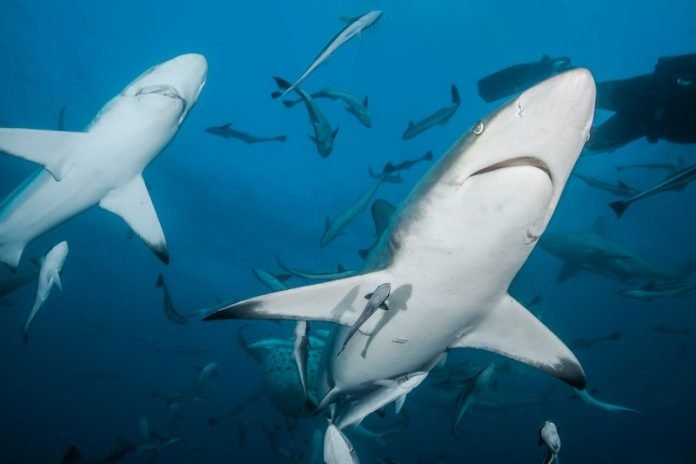
Sharks, the ocean’s ancient guardians, have been swimming the Earth’s seas for over 400 million years, outliving five mass extinctions and evolving into various species with unique ways of life.
However, today, these magnificent creatures face a dire threat due to excessive fishing and the harmful practice of finning, where sharks are caught, their fins cut off for sale, and their bodies thrown back into the sea.
This has placed sharks among the most endangered species worldwide.
Despite efforts by governments to control the killing of sharks through various laws, a recent global study has shown that these majestic creatures are still being caught and killed in increasing numbers.
This research, which looked into shark catches from 2012 to 2019, aimed to check if the new rules were helping to save sharks.
The findings were alarming: shark deaths have not decreased but slightly risen, from 76 million to 101 million sharks a year, with a significant portion of these catches involving species at risk of extinction.
The study, a collaboration among experts from Dalhousie University, UC Santa Barbara, and The Nature Conservancy, revealed that despite the introduction of many laws meant to stop finning, the overall number of sharks caught has not gone down.
In particular, coastal fisheries, which account for the majority of shark deaths, saw a steady increase in shark mortality. This is in contrast to some controlled open-ocean fisheries where shark deaths have seen a slight decrease.
The research also showed that outright bans on shark fishing and responsible management were the only measures linked to lower shark mortality rates. This suggests that creating shark sanctuaries and other conservation areas could be effective strategies for protecting sharks.
Interestingly, the study found that while regulations against finning might have reduced the practice of finning itself, they did not lessen the overall number of sharks killed.
In some cases, these rules may have even led to more sharks being caught as the entire shark began to be used, not just the fins, promoting markets for shark meat and other products.
This shift has increased the demand for shark meat in countries like Brazil and Italy, sometimes leading to consumers unknowingly eating shark meat due to mislabeling.
The researchers argue that simply targeting finning is not enough. More focused actions are needed to address the overall mortality of sharks, such as banning fishing in certain areas or mandating the release of accidentally caught vulnerable species.
Additionally, the study highlights the need for greater community involvement and awareness, particularly in places where small-scale fisheries significantly contribute to shark deaths.
To truly protect sharks, the authors suggest a combination of geographic protections and specific fishing regulations that discourage catching overfished and threatened species and reduce bycatch.
They also emphasize the importance of holding fishing fleets, companies, and regulatory bodies accountable for implementing these measures effectively.
The study underscores the urgent need for better transparency and reporting in shark fishing, pointing out that often, catch data are not detailed enough to assess the impact of conservation efforts accurately.
This lack of precise information hampers efforts to protect sharks and other endangered species.
In conclusion, while the situation for sharks is grim, there is hope. The path to saving these ancient ocean dwellers requires immediate action, combining effective regulations with increased awareness and accountability. The time to act is now to prevent a global extinction crisis for sharks.
The research findings can be found in the journal Science.
Copyright © 2024 Knowridge Science Report. All rights reserved.



